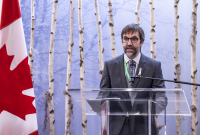Support strong Canadian climate journalism for 2025
If countries keep negotiating the terms of a new biodiversity plan — one that will determine the future of life on Earth — at their current pace, the world will continue to barrel head-first into the biodiversity crisis, civil society groups warn.
“We are going to remember … that someday, in the year 2022 in Montréal, some group of people came together to decide the future of nature, the future of people and the future of the planet,” Joseph Onoja, director general at the Nigerian Conservation Foundation, said at a press conference in Montréal.


Three days in, the stakes could not be higher at COP15. To be a success, the twice-delayed United Nations biodiversity conference — hosted in Montréal but presided over by China — must create a framework to halt and reverse biodiversity loss before ecosystems hit critical tipping points.
The event is comparable to the negotiation of the Paris Agreement, a landmark climate deal countries signed in 2015 with the goal of limiting global temperature rise to 1.5 C. But the text of the global biodiversity framework is still riddled with square brackets — an indicator that countries have yet to agree on some of the biggest issues at hand — and civil society groups, including the World Wildlife Fund, say at this pace, the negotiations will fail to deliver what is needed.
“I'm calling on the negotiators to speed up because we do not have time. We've been here for some days now and we've not seen anything concrete,” said Onoja.
As always, funding is a contentious issue. Developed, wealthy countries, like Canada, are largely responsible for both climate change and biodiversity loss. Much like climate finance, where the countries least responsible for climate change receive funds from wealthy, polluting nations to adapt to and deal with the impacts of climate change, nations with great biodiversity but limited resources are pushing for a similar financing framework to help developing countries meet conservation goals. The recent UN climate conference in Egypt delivered a historic win on climate finance, and many countries, including Brazil, want to see a similar outcome in Montréal.
Other key issues include ensuring countries are fairly compensated for drug discoveries and other uses of genetic materials within their borders, standards for reporting and monitoring progress on biodiversity protection and expanding conservation areas to protect 30 per cent of both land and sea by 2030.
On Dec. 9, some civil society groups even argued the 30 per cent goal is outdated, and the world should actually strive for 50 per cent protection by 2030 to address the biodiversity crisis.
Although not formally adopted by the conference, more than 190 nations have agreed that Indigenous people must be fully consulted on conservation and play a role in how those decisions are made, according to federal Environment Minister Steven Guilbeault.
Next week, more than 100 ministers from countries across the world join the negotiations. Ministers are critical to reaching agreements, but it all depends on how and when China deploys them, Li Shuo, global policy adviser for Greenpeace East Asia, told Canada’s National Observer in an interview.
China is planning to pair one minister from a developing country with one from a developed country to be co-chairs on a certain issue the presidency believes is really important and difficult to solve, said Shuo. He said this is likely to happen on Dec. 17, which, in his view, is “a bit too late.”

For example, “a similar exercise is used in climate negotiations, normally, about four days before the closure of the conference,” said Shuo. If China waits until Dec. 17 to deploy the ministers in this way, that only leaves three days to resolve outstanding issues, which will probably mean “a pretty intense and dynamic end game,” he added.
The best-case scenario, Shuo says, is if China and Canada can use their positions as large countries in the Global South and Global North, respectively, to help bridge that divide between countries to reach a final deal.
“I have been personally in contact with dozens and dozens of ministers from four corners of the planet over the last more than six months,” Guilbeault said at a media callback on Dec. 9. “To prepare for this, we have a WhatsApp group chat on which we exchange daily information updates… It's going to be even better when they get here so we can do this work face-to-face.”
Civil society groups are concerned world leaders are not attending the conference, but Guilbeault said leaders do not have to be present for agreements to be reached and that delegates will be communicating with them regularly.
– With files from The Canadian Press
Natasha Bulowski / Local Journalism Initiative / Canada’s National Observer







Comments